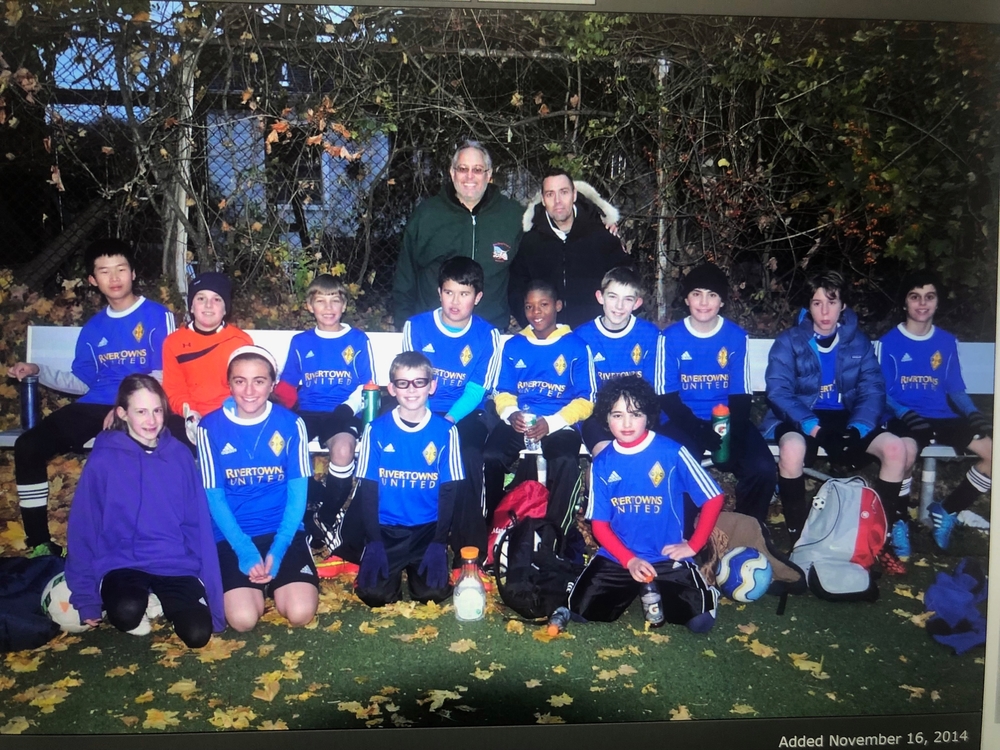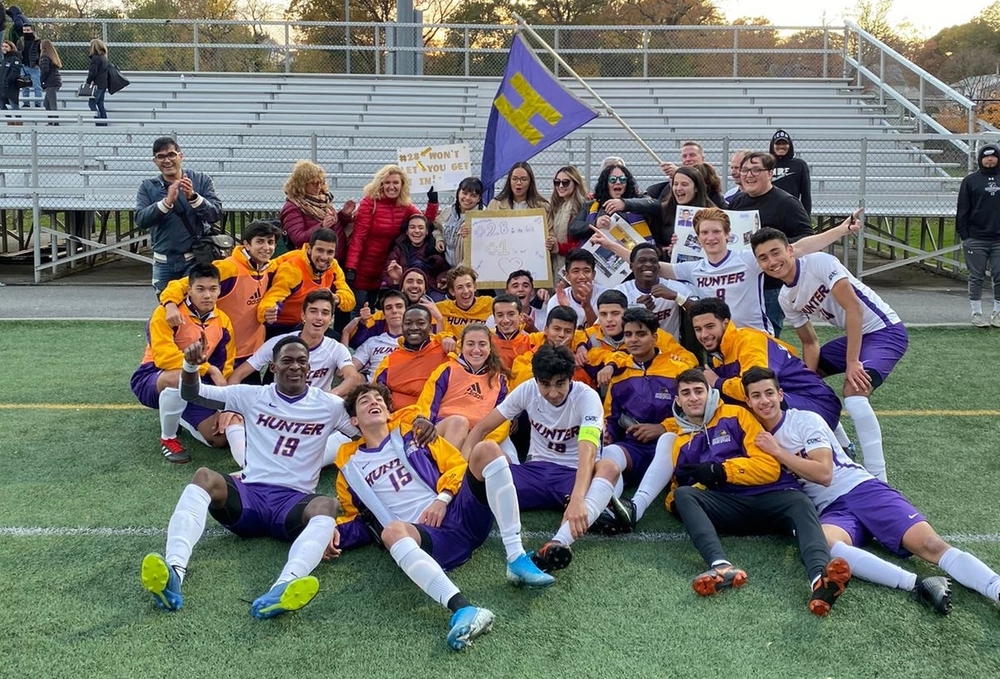On the first day of Hunter’s soccer season, Tia Abirizk felt nervous. She sat apart from the rest of her teammates before practice. On the field, she held back during plays, watching others pass the ball to each other.
Coming on as a freshman, Abirizk had to show the upperclassmen they could trust her with the ball. After a few practices, she proved she could compete in the men’s league.
“It was just a different type of soccer that I had to adjust to,” said Abirizk, a forward. “It’s just the environment itself, being surrounded by a bunch of guys every single day in the morning than being surrounded by girls every day in the morning. It’s different.”
Abirizk is the only woman on the Hunter College men’s soccer team. The university lacks a women’s team, so Abirizk pursued the best option to keep playing the sport. After a season of competing in the men’s league, Abirizk learned resilience and adaptability in one of her greatest challenges to date.
Abirizk started playing soccer in sixth grade. Her father took her to a field in her hometown, Hastings-on-Hudson, New York, every afternoon to practice. Abirizk laughed when she described the hours she spent running drills.
“In the beginning I hated it, because it was constantly every day, every day,” said Abirizk. “I started getting used to it, like, ‘Okay, this is not bad.’”
Abirizk changed from someone disinterested in soccer to the captain of her high school and club team. At one point, Abirizk played on three teams at the same time: the Hastings High School team, the New York Surf Soccer Club and the Rivertowns United Football Club, or RUFC. Abirizk eventually moved from RUFC to the New Jersey chapter of Cedar Stars, which she describes as a more competitive league.

However, just when Abirizk started considering a professional soccer career, a dislocated kneecap forced her to rethink her options. After the doctor told her she had to sit out for five months, Abirizk started to cry.
“Sports at that time was like my life,” said Abirizk. “So after then, I realized going into professional soccer is gonna be hard because if you get injured, your career is over.”
Abirizk also felt less inclined to play professional soccer after learning about the inequality between women’s and men’s pay. The U.S. Women’s Soccer Team filed a gender discrimination lawsuit in March against U.S. Soccer, the governing national body for the sport. The women players argue they are paid less than their male counterparts and also experience unequal working conditions, hotels and travel arrangements. A judge granted the lawsuit class-action status last month and set a trial date for May 5, 2020. Abirizk said the lack of fair pay contributed to her decision to look elsewhere for a job.
“After I found that out I was like, ‘You know what, it might not work out as a professional soccer player,’” said Abirizk.
College recruiters still offered her places on their soccer teams during her junior and senior years of high school. But Abirizk based her university decision on medical programs.
Abirizk’s attention turned to medicine during a family trip to Lebanon, where she noticed a disabled man in the street. After that experience, Abirizk decided she wanted to become a doctor to provide adequate medical resources to everyone. After receiving her college acceptance letters, Abirizk decided Hunter was the best option.
Meanwhile, John Sanchez, Hunter’s head soccer coach, heard about Abirizk from Abirizk’s mother, who happened to be Sanchez’s dentist. Abirizk said he trained with her a few times and suggested she could join the men’s team. Other women had approached the coach in prior years, but never came to tryouts. However, Abirizk impressed the coach by following through on the offer, according to Sanchez.
Joining a men’s team was not entirely new for Abirizk. In eighth grade when she played in RUFC, Abirizk and three of her female teammates would sub in when the other team needed more players. She said that experience helped her feel more confident in joining the college’s men’s team.
“Well, you could say that playing with the boys helped to get the mindset that I’ve played with guys once, I can do it again,” said Abirizk. “The most important thing was to prove girls can do it too. It may be harder for me but why not step up to the challenge, you know?”

During the summer, Abirizk joined an informal practice Hunter’s soccer captains held to determine if she could play with men. It surprised her how much she enjoyed it.
“It’s like intense practice but I’m able to keep up with them,” said Abirizk. “Like it wasn’t that hard, it was a lot of fun. And especially seeing their faces, all being shocked that there’s like a girl with them. I enjoyed that!”
In the fall, she tried out with other potential recruits. During the Manchester United Fitness Test, where players run 22 100-yard sprints in 22 minutes, Abirizk started feeling the differences between her and the men on the team. She could only make it through about half the test. Her teammate Juan Castillo admitted they could run faster than her, but that Abirizk demonstrated agility.
“She knows how to make penalties better than me, she knows how to kick the ball better than me,” said Castillo, a senior studying economics. “It was just kind of the pace, and I guess conditioning as well. But other than that, her skills and everything were basically on par with everybody.”
After three days of tryouts, Abirizk made the team. She arrived at Hunter from the 97 St. dorms every day at 7:00 a.m. to drive to Randall’s Island for practice. Abirizk engaged in every exercise or scrimmage alongside the other players. She changed in a separate locker room and got her own room during away games, but other than that, the coach treated her just like the men on the team. At first, Abirizk worried about her relationship with her male teammates.
“I can tell you at first I was so nervous,” said Abirizk. “I was afraid some guys would hate me and would wanna like hurt me on purpose. But they turned out all of them, each and every one of them, very nice.”
Abirizk formed friendships with three players on the team in particular: Castillo, Leonel Brito and Brian Martinez, who all play defense. Castillo recounts the day he decided to talk to Abirizk during the fall semester’s first practice.
“I didn’t want her to feel like she was kind of less than everybody else or, like, out of it,” said Castillo. “We started cracking some jokes, and then she turned out to be pretty chill, so I was like ‘Aight, she’s a bro now.’”

As Abirizk joined the men’s roster she learned the differences between men’s and women’s soccer. Abirizk said men spread out while women stay closer to each other. Men are “quicker on the ball” but women interact in a more aggressive manner towards each other, according to Abirizk. Throughout the season, Abirizk learned to conform to the nuances in the game and also to push past her own insecurities.
“It’s more like a mental thing, playing with the guys,” said Abirizk. “I didn’t think about pushing them like I push the girls. Towards the end of the season, now I start shoving them back and I start showing them, ‘Yeah, I can shove back.’”
Although Abirizk adapted to playing with a group of men, she did not play in an official game this season. Her coach said he recruited Tia because she had potential but she did need to work on her speed and strength.
“I think it’s a lesson that she could be on the team, get better, and understand what is expected,” said Sanchez.
However, Coach Sanchez listed Tia’s skill and knowledge of the game as the reasons why he brought her onto the team. She also impressed him by joining the men’s team in the first place.
“I think that says about her drive, wanting to succeed, and that whatever she wants to do in her life, whether try out for the team or be part of the team, that she’ll make it work,” said Sanchez. “She’ll do whatever she can to be part of it.”
As a freshman, Abirizk said she still feels unsure of her career path, but she will continue playing soccer. She gained a newfound interest in medicine, yet still feels compelled to play the sport.
“But out of everything I’ve done, soccer is what I love the most,” Abirizk said.









